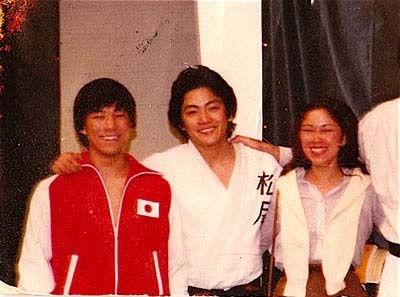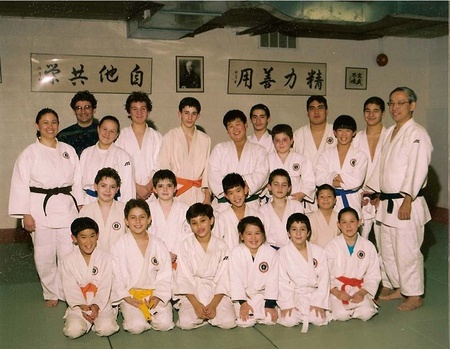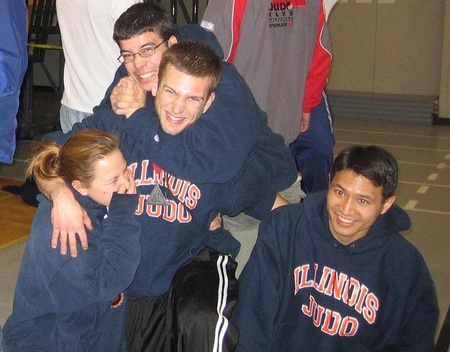Like returning home after a long journey, stepping onto the tatami at the dojo is one of the most relaxing moments I look forward to after a long day of work. A wave of excitement builds as I change into my gi, enter the dojo, slip off my zori (flip flops), step onto the mat, and bow as I enter. At this moment, it’s as if all the troubles of the day disappear and what is left is a mind that is clear, calm, and ready to learn.
As we begin warm ups, a surge of energy pulses through my veins and my body prepares for uchi komi (repetition of practice without throwing). Usually, this part of practice exerts so much energy that I’m breathless when it comes time for randori (free practice), but the three minute rounds fly by and before I know it, practice is over. We line up facing the sensei (instructor(s)) and the commands are given, “Seiza. Mokuso. Ya-mei. Sensei ni rei. Shomen. Rei.” (Kneel. Meditation. Break meditation. Bow to instructor. Face (a picture of) Jigoro Kano. Bow.) As I break from the kneeling position and leave the mat, I feel a mixture of exhaustion and rejuvenation. I’m glad to be home.
Growing up, judo was my salvation. Here, I escaped the bullies, bad grades and chores. I loved being on the mat and picked up judo pretty quickly. Mimicking the techniques taught by my sensei was easy. The challenge was executing that technique during randori or a tournament. Just like any other competitive sport, losing a match is never fun but there are two ways to lose. You can leave feeling sour and frustrated at not winning or learn from your mistakes and practice to improve. There is a story my friend, Jarrod, used to tell. For several years in a row during his youth, Jarrod’s dad attended lots of tournaments throughout the year and lost every match. While some would see this as grounds to quit, his dad continued to compete and soon began to win his matches. I see two lessons to this story. The first: Never give up. The second: It’s not about the winning or losing, it’s about what you take away from the match for the next time. Lessons like this also helped me deal with the bullies and bad grades, although I still don’t like to do chores.
Judo also kept me connected to my Japanese heritage. On the mat, I learned how to count and some vocabulary. Off the mat, there were celebrations and demonstrations at various events throughout Chicago. I have fond memories of pounding mochi at the annual Kagami Biraki (opening ceremony for the first practice of the New Year) and demonstrations at the Botanical Gardens. Being a part of a judo club made making friends a lot easier, too. I think this is because no one on the mat excels at everything. Each of us has particular strengths and weaknesses and we rely on each other for our own improvement. Because judo is this constant give and take situation, the friendships between judoka can become very close and I find that some of my most trusted and longest friendships are with those who I have met through judo.
Judo means the world to me and I owe it all to my mom. Being a judoka herself, she knew the benefits my sister and I could take away from being in a sport that was also a strong community. She put my sister, Stephanie, and I in judo at ages five and eight, respectively, and was the biggest supporter and coach at all our tournaments. When I was eleven, my mom helped me to train for the Junior Olympics. Every morning during that summer, she would run four and a quarter miles with me. Actually, most of the time she had to drag me nearly the whole distance because I was lazy, stubborn, and unmotivated. A month before the tournament, she sent me to judo camp and, while I didn’t win a medal, I fought some of the best matches in my life. The whole summer is an experience I will never forget.

Like me, my mom was in a judo club while she was in college. Here she is pictured with her judo friends.
I still remember the first time I met my mom’s judo friends, Doug and Dean, barbequing teriyaki chickens during the Ginza Festival, at the Midwest Buddhist temple in Old Town in Chicago. When I think back on that day, I distinctly remember this first meeting with Doug, the air thick with smoke from the chickens roasting over the cinderblock pit, the smell from the shoyu glaze burning over the fire, it was a hot August day but still people crowded into lines and at tables for some of the best teriyaki I’ve ever had. I remember Doug’s smile and cheery hello as my mouth watered waiting for the huge chunk of chicken served on a bed of white rice with a side of coleslaw. At the time, the only thing I knew about this man was that he was in charge of the chicken that I would soon devour so that it could rest happily in my belly. A month later he would become my sensei, giving my sister and me our first lessons of falling. After that first night of practice, I was in love.
I have practiced judo for more than half of my life, now. Most recently, after putting it off for some time, I finally accepted the promotion to shodan (first degree black belt). Growing up, I saw earning a black belt as an indication of expertise, that by becoming a black belt I would be able to learn the inner most secrets of judo. However, the only secret to success in judo is something I learned as a white belt. Go to practice, and when you’re there practice hard and with your whole heart. If home is where the heart is, then mine can be found wherever there is mat filled with sweaty, hardworking, judoka, and my mom, if not on the mat with me, coaching me from the sidelines.
Side note:
I began judo in 1993 at Tohkon Judo Academy in Chicago, IL. Two years later, I joined Tenri Judo Dojo, located in Des Plaines; I currently attend practice, when possible, at both locations. While at attendance at the University of Illinois, Urbana-Champaign, I practiced with the Illinois Judo club.
* This article was originally publised in the Voices of Chicago by the Chicago Japanese American Historical Society.
© 2008 Chicago Japanese American Historical Society





